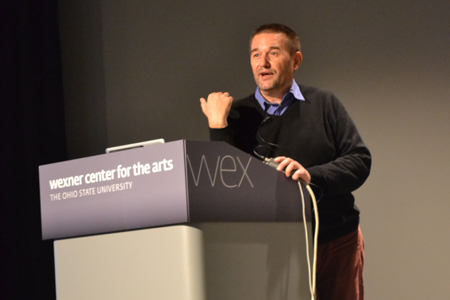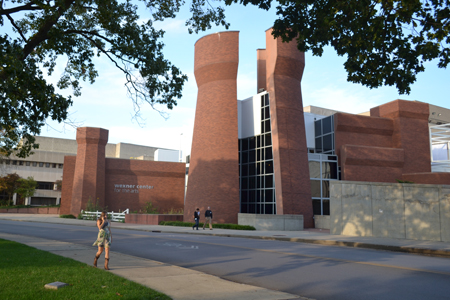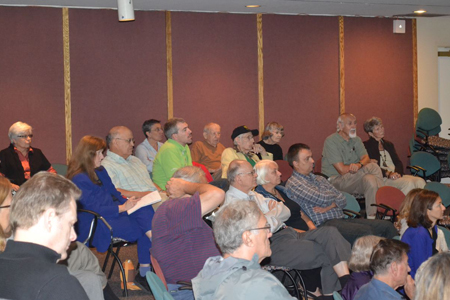 |
|||||||
|
|||||||||||||||
On September 28 and 29, 2012 Yuri Shevchuk, the director of the Ukrainian Film Club of Columbia University visited the city of Columbus, OH, on the joint invitation of the Department of History of Art at the Ohio State University and the local Ukrainian Cultural Association. The program of his stay included two lecture presentations. The first one, "Ukrainian Cinema Today," took place at the Wexner Center for the Arts of the OSU, a venue that by its design and technological capabilities would surely satisfy the most discerning cinephile. The talk, which was organized for students, faculty, and the larger community, was followed by the screening of The Fire-Crosser, the latest feature narrative drama from Mykhailo Illienko. The film is Ukraine’s entry for the 2012 Academy Awards in the category of Best Foreign Language Film. Despite the fact that the event took place during normal working hours, an audience of some forty people gathered and engaged the presenter in an interesting and stimulating Q-and-A session after the film.
Among others present at the event were OSU professor of art history and preeminent US authority on Ukrainian avant-garde art, Myroslava Mudrak, and Professor Yana Hashamova, the university's leading expert on Russian and Soviet cinema, who authored the important book, Pride and Panic: Russian Imagination of the West in Post-Soviet Film (2007).
The second presentation, a lecture entitled "Soviet Films of the 1920-1930s and Stalin's War on Peasants," was held at the Upper Arlington Public Library on the initiative of the Ukrainian Cultural Association of Columbus. Based on his research of extensive filmic and other documentary sources of the era, Shevchuk discussed the role film played in the physical elimination of millions of independent peasants
of the Soviet Union, that which history books today euphemistically refer to as "collectivization." The massive use of films and employment of some of the greatest filmmakers like Sergei Eisenstein, Oleksander Dovzhenko, Ivan Kavaleridze, or Fridrikh Ermler facilitated the "liquidation of the kulak as a class" in the USSR in general, and the execution of the genocide of the Ukrainian people in particular during the artificially organized Great Famine of 1932-1934 (also known today as the Holodomor). This aspect of the Soviet film history remains both ignored and overwhelmingly unknown. The presentation, which was copiously illustrated by clips taken from films featuring the character of kulak, or independent peasant, by S. Eisenstein (The General Line and Bezhyn Meadow), O. Dovzhenko (Zvenyhora and Earth), A. Medvedkin (Happiness), F. Ermler (Peasants), Pyriev (The Party Card), S. Bukovsky (The Living), and others, provoked a very lively discussion among the audience.
|
|||||||||||||||


